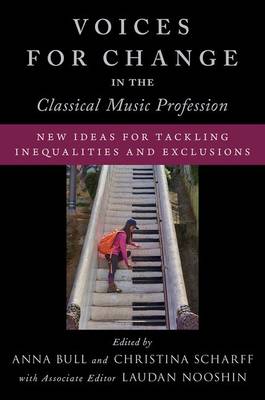
- Afhalen na 1 uur in een winkel met voorraad
- Gratis thuislevering in België vanaf € 30
- Ruim aanbod met 7 miljoen producten
- Afhalen na 1 uur in een winkel met voorraad
- Gratis thuislevering in België vanaf € 30
- Ruim aanbod met 7 miljoen producten
Zoeken
Voices for Change in the Classical Music Profession
New Ideas for Tackling Inequalities and Exclusions
Anna Bull, Christina Scharff
Paperback | Engels
€ 42,45
+ 84 punten
Omschrijving
How is the classical music industry responding to the challenges of #MeToo, Black Lives Matter, and other social justice movements? Is increasing attention to equity and diversity in the classical music profession over recent years leading to systemic change? In this book, scholars, activists and musicians from countries across Europe and North America analyze inequalities in the classical music profession and introduce strategies for making change. Exploring racism, class and gender inequalities, disability representation, "authenticity", changing the canon, and neoliberalism, the book brings together analyses from academics alongside contributions from musicians and industry leaders working in the classical music industry who reflect on issues of diversity and share insights and best practices. Themes of the book include institutional legacies and possibilities for change; racial, classed and gendered inequalities and marginalised voices; and strategies for activism, whether reflective practices, informal networks, or larger organisations leading change. The book also discusses questions such as whether musical change is necessary for social change in classical music, and how activists can acknowledge structural inequalities whilst holding on to the possibility of change. Opening up the interdisciplinary field of "classical music studies," this book lays the groundwork for empirically-founded, theoretically-informed, and practice-based approaches to tackling inequalities in the classical music profession. As such, it will be a significant point of reference for musicians, students, classical music administrators, policy-makers, teachers, and academics -- and anyone else who wants to make classical music more inclusive.
Specificaties
Betrokkenen
- Auteur(s):
- Uitgeverij:
Inhoud
- Aantal bladzijden:
- 368
- Taal:
- Engels
Eigenschappen
- Productcode (EAN):
- 9780197601228
- Verschijningsdatum:
- 13/03/2023
- Uitvoering:
- Paperback
- Formaat:
- Trade paperback (VS)
- Afmetingen:
- 156 mm x 235 mm
- Gewicht:
- 535 g

Alleen bij Standaard Boekhandel
+ 84 punten op je klantenkaart van Standaard Boekhandel
Beoordelingen
We publiceren alleen reviews die voldoen aan de voorwaarden voor reviews. Bekijk onze voorwaarden voor reviews.











